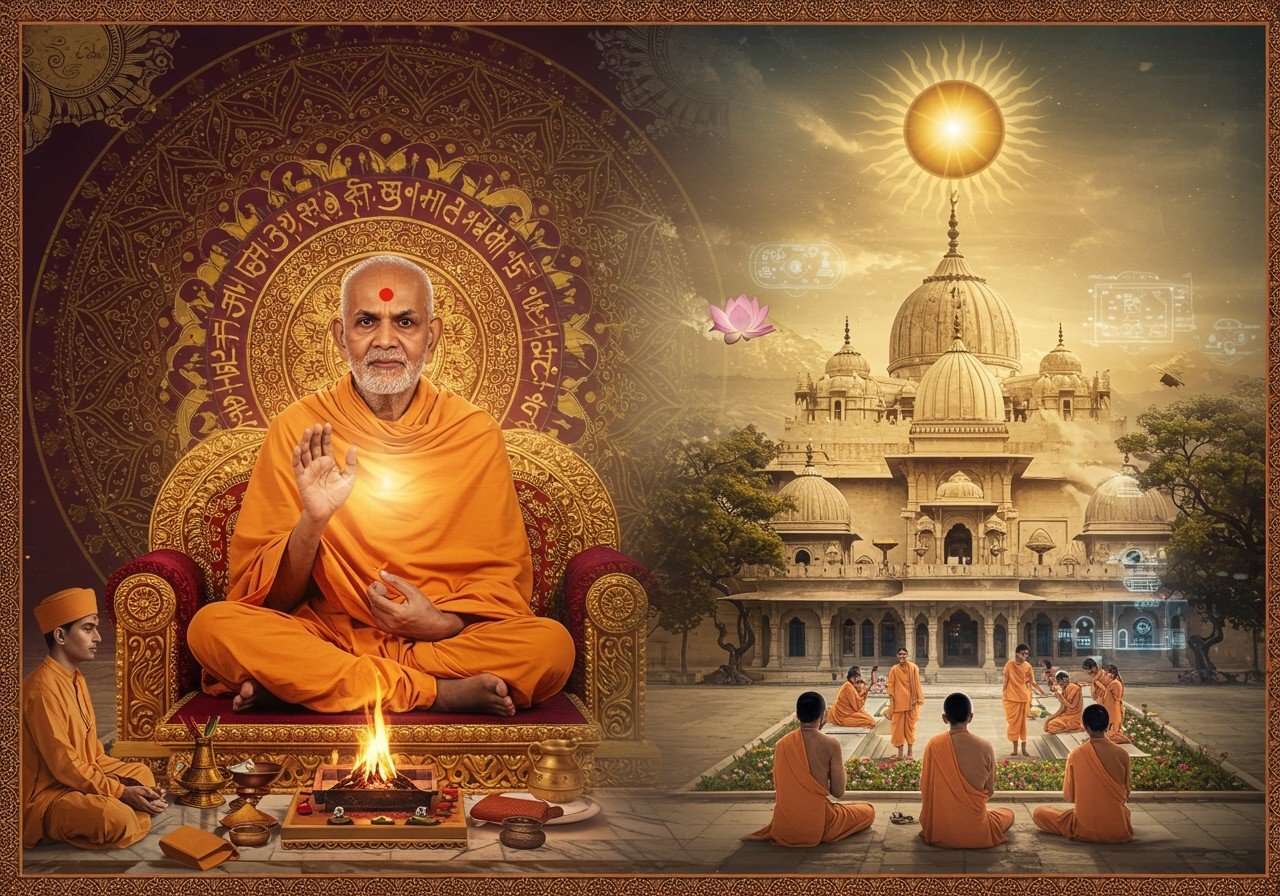
The Arya Samaj and Swami Shraddhanand have indelibly shaped modern Indian society and culture. Founded in 1875 by Swami Dayananda Saraswati in Bombay, the Arya Samaj sought to reform and revitalize Hindu practices by emphasizing the Vedic scriptures. Swami Shraddhanand, a pivotal leader within this movement, made substantial contributions to social reforms in the early 20th century. His tireless efforts, including the Shuddhi Movement and his dynamic interactions with Mahatma Gandhi, left an enduring impact on India’s journey towards progress and independence. Let’s explore their interwoven stories and lasting influence.
The Dawn of Arya Samaj: A Return to Vedic Roots
Origins and Principles: Established on April 10, 1875, Arya Samaj aimed to cleanse Hindu practices by focusing on the monotheistic concept of “Om” and rejecting idol worship. The movement advocated a return to the core tenets of the Vedas, promoting education, gender equality, and the eradication of caste discrimination. These principles resonated deeply within Indian society, paving the way for substantial social change.
Linguistic Unity: Arya Samaj also championed Hindi and Sanskrit, recognizing their power to unite India’s diverse linguistic landscape. This initiative aimed to foster a stronger sense of cultural cohesion, bridging regional divides and nurturing a shared national identity. By emphasizing these ancient languages, Arya Samaj sought to create an inclusive society that valued both tradition and progress.
Explore the diverse traditions of Hinduism in our insightful blog post.
Swami Shraddhanand: A Beacon of Reform and Education
Born in 1856 in Talwan (Jalandhar), Swami Shraddhanand, originally known as Mahatma Munshi Ram, became a prominent figure within Arya Samaj. His early experiences shaped his profound commitment to societal transformation. He firmly believed in a Vedic-based education system, free from colonial influences. In 1902, he realized this vision by founding Gurukul Kangri, an institution dedicated to providing education rooted in Vedic ideals with a national perspective. This Gurukul also played a significant role in promoting education for girls, challenging traditional societal norms.
A tireless advocate for social reform, Swami Shraddhanand championed the upliftment of Dalits and other marginalized communities. He fought relentlessly against the caste system, advocating for a more just and equitable society. His unwavering dedication made him a symbol of hope and progress for countless individuals seeking a better future.
The Shuddhi Movement: Reclaiming Hindu Identity
The Shuddhi Movement, spearheaded by Swami Shraddhanand, focused on reconverting individuals back to Hinduism. During British rule, many Indians faced immense social and political pressures to convert to other faiths. The movement sought to counteract these forces, employing compassionate strategies that engaged communities in meaningful dialogue and reaffirming Hindu identity through traditional ceremonies. Though facing opposition, the Shuddhi Movement strengthened a sense of belonging and unity among Hindus at a critical juncture in India’s history.
A Confluence of Minds: Swami Shraddhanand and Mahatma Gandhi
The relationship between Swami Shraddhanand and Mahatma Gandhi was complex yet impactful. They shared common ground in their commitment to social reform and the upliftment of marginalized communities. Both leaders collaborated in the Non-Cooperation Movement, striving for India’s independence from British rule. While they held differing views on religious conversion methods – Swami Shraddhanand focused on returning to one’s ancestral faith, while Gandhi prioritized broader social unity – they maintained mutual respect and contributed significantly to the freedom struggle.
The Enduring Impact: A Legacy of Progress
The principles of Arya Samaj, with its emphasis on education, social equality, and religious reform, continue to resonate deeply within Indian society. The movement’s work in promoting Hindi and Sanskrit has played a crucial role in uniting India’s diverse linguistic landscape. Swami Shraddhanand’s influence transcends his lifetime, inspiring generations of reformers with his advocacy for education and social justice. Today, Arya Samaj faces new challenges and opportunities as it adapts its message for modern times, striving to connect with younger generations while preserving its core values. Swami Shraddhanand’s legacy stands as a testament to the power of unwavering dedication to societal progress, reminding us of the importance of pursuing justice, harmony, and a better future for all.
How Poojn.in Supports Your Arya Samaj Practices
At Poojn.in, we understand the significance of authentic ritual items in practicing your faith. As India’s largest Dashakarma Bhandar, we offer a wide selection of products specifically for Arya Samaj ceremonies:
- Pure Copper Havan Kunds: Available in various sizes to suit your needs, ensuring the purity of your sacred fire.
- High-Quality Havan Samagri: Crafted from natural ingredients, promoting a pure and traditional havan experience. Explore our flammables section for more options.
- Wooden Items: Discover samidha, yagya accessories, and other essential wooden items crafted with traditional care.
- Sacred Threads and Vastras: Find pure cotton vastras and sacred threads for your ceremonies, upholding the sanctity of your rituals. Check out our holy clothing collection.
- Vedic Ritual Items and Prayer Materials: Explore a comprehensive range of items to enhance your prayer and ritual practices. You can also browse our collection of holy books for deeper understanding.
Our offerings align with the Arya Samaj emphasis on simplicity and Vedic traditions. We prioritize:
- Natural Materials: We avoid artificial additives, ensuring the purity of your ritual items.
- Simple Design: Our items are unadorned and respectful of traditional aesthetics. Find beautiful and simple decoratives for your home.
- Quality Ingredients: We meticulously quality-check all ingredients for purity and authenticity.
- Traditional Craftsmanship: Many of our items are crafted by skilled artisans, preserving traditional techniques.
Need guidance on selecting the right items for your Arya Samaj ceremonies? Our team is here to assist you. Reach us at:
- Phone: 03369029784
- WhatsApp: 9476142738
Shop conveniently online and enjoy home delivery across India. Visit poojn.in today!
Frequently Asked Questions about Arya Samaj and Swami Shraddhanand
What is Arya Samaj? Arya Samaj, founded by Swami Dayananda Saraswati on April 10, 1875, is a Hindu reform movement that emphasizes Vedic teachings and promotes values such as truth and non-violence. It actively seeks to remove social practices deemed contrary to the Vedas, advocating for a return to the original essence of Hindu dharma. The movement strives to create a just and equitable society rooted in Vedic wisdom.
Who was Swami Shraddhanand? Swami Shraddhanand, born in 1856, was a prominent leader within Arya Samaj. He dedicated his life to education and social reform, tirelessly working to spread Vedic knowledge and combat caste discrimination. His founding of Gurukul Kangri in 1902 exemplifies his commitment to providing holistic education rooted in Vedic ideals, fostering national pride and empowering future generations.
What are the key principles of Arya Samaj? Arya Samaj’s core principles include truth, righteousness, and the propagation of Vedic knowledge. It rejects idol worship, promoting a direct connection with the Divine. The movement strongly emphasizes education and social equality, advocating for a society free from discrimination and injustice. It champions the empowerment of individuals through knowledge and encourages active participation in societal betterment.
What was Swami Shraddhanand’s Shuddhi Movement? The Shuddhi Movement, initiated by Swami Shraddhanand, aimed to reconvert individuals back to Hinduism who had previously converted to other religions, often under duress. The movement emphasized the importance of reclaiming one’s ancestral faith and cultural heritage, offering a path back to the Hindu fold. It focused on providing support and reintegration into the community.
How did Swami Shraddhanand influence Mahatma Gandhi? Swami Shraddhanand significantly influenced Mahatma Gandhi through his deep commitment to social reform and education. Their shared values of uplifting the oppressed, championing non-violence, and advocating for a just society fostered mutual respect and understanding, even amidst their differing approaches. Their combined efforts created a powerful force for positive change in India.
Why is Arya Samaj important today? Arya Samaj remains relevant today by continuing its focus on education, social equality, and the eradication of caste discrimination. Its principles of truth, righteousness, and Vedic knowledge contribute to creating a more progressive and harmonious society. The movement’s ongoing efforts to adapt to modern challenges ensure its continued impact on future generations.
How does Arya Samaj view traditional rituals? Arya Samaj emphasizes simplicity and authenticity in rituals, encouraging practices that align closely with Vedic teachings. It discourages elaborate or superstitious rituals, promoting a more direct and meaningful connection with the Divine. The focus is on inner transformation and spiritual growth rather than outward displays of piety.
What role did Swami Shraddhanand play in promoting education? Swami Shraddhanand was instrumental in promoting education, particularly through the establishment of Gurukul Kangri. He viewed education as a powerful tool for empowerment and social progress. He worked tirelessly to make education accessible to all, regardless of caste or gender, challenging prevailing societal norms and laying the foundation for a more educated and enlightened India.


